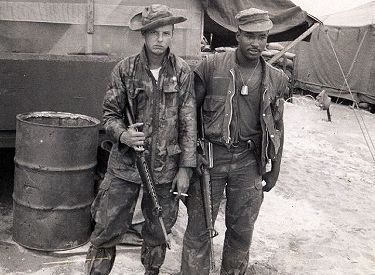 | ||||



Share Your Stories & Pictures - Send Them to: Vin@FirstMarines.org
It's All There in Black and White
By Dave Beakey
2nd Bn 1st Marines
Echo Company 1968 - 1969
I was born poor, in Tucson, Arizona, in 1949. My mother and father lived next to what was then called an “Indian Reservation”. The Native Americans who lived there were even poorer than us. A mere generation before, their forefathers had hunted, worshiped and roamed the land freely. Occasionally, I would see one of them ride by my house on a horse, dressed in a mix of clothing; perhaps an old derby hat, a poncho, homemade pants and moccasins. My father was a WWII veteran, an anti-aircraft gunner. He fought in the Philippines and New Guinea. Of course he never spoke of his experiences in the war. But two or three times a year he would have to seek treatment for the malaria that never left his body. My father was a janitor. Another child was born. He was mentally retarded and required constant attention, so my mother did not work. She stayed home and took care of the boy with Down’s syndrome. We were Baptists. She never considered giving up the second son, she just accepted the fact that she would be a full time caretaker forever, until the boy died and went to heaven.
Our family moved to West Virginia. We lived in a trailer court. Everyone in the trailer court was poor, but they shared food and bought clothes at rummage sales. We got by. It was in West Virginia that I was introduced to the black Baptist preachers. I was amazed! They had gold teeth. They rhymed their sentences. They got sweaty and took off their jackets and threw them across the room. They brought in singers and had choirs that sang songs like, “Troubled, Lord I’m Troubled” and “You’ve Got Jordan River to Cross.” Sometimes, I was the only white boy in the church, but I was always welcome. My fathers’ job title changed. Now he was a “custodian.” We were still poor.
We moved to Massachusetts in 1959. We attended the First Baptist Church in Hingham. I was getting older. By the early 1960’s, I started to recognize the subtle racism in Massachusetts. But my parents were oblivious to racial boundaries and they soon became friends with the three black families in our church. We were still poor. The church members bought us a car. We had a telephone, but could only afford a “Party Line”, which meant that we shared the phone with someone in our neighborhood. In January of my senior year of high school, my father went with me to the Marine recruitment office. I was 17 ½ years old, so my father had to sign a form, agreeing to let his son join the Marine Corps after high school graduation. I graduated in June and on July 31, 1967 headed (by train) to Parris Island. I completed Basic Training, and like 90% of my fellow marine graduates, was given an MOS of 0311 (Rifleman, Infantryman, Grunt). I went to North Carolina for Advanced Infantry Training. I went home for 30 days and then went to California for Jungle Warfare Training. Then I was on a plane to Okinawa. A week later, I arrived in Vietnam. Then, the Tet offensive of 1968 exploded. Tactically, the US and ARVN forces decimated the VC and NVA. But it was a psychological victory for our enemy. They proved that they were strong enough to hit us simultaneously throughout the country.
After a few months I started to notice something. All of the grunts, the men who went into the bush to fight the enemy were blacks, poor whites (like me), Hispanics and Native Americans. The sons of rich or politically connected parents got college deferments, were disqualified for nonexistent disabilities, or if they came to Vietnam, were stationed in the “rear with the gear.” Others fled to Canada to avoid the draft. So it was up to the people who are now put in the category of “low socioeconomic status” to run night patrols, set up ambushes, get wounded and get killed. I look around now and see that things are a little better. But we’ve still got some work to do.
